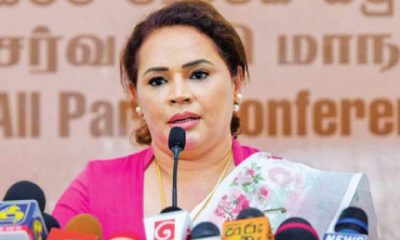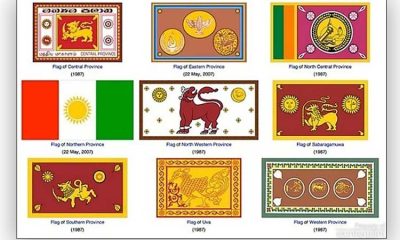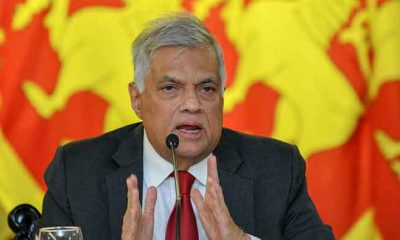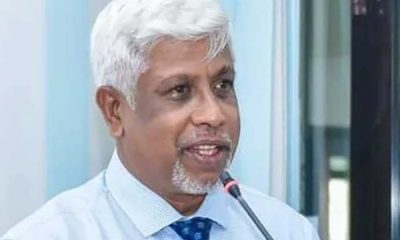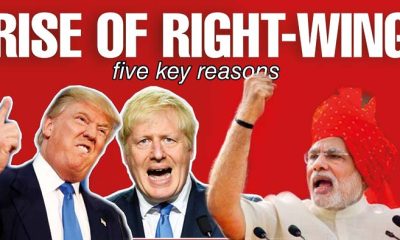Features
Political Reforms: Vanishing prospects and time warp debates
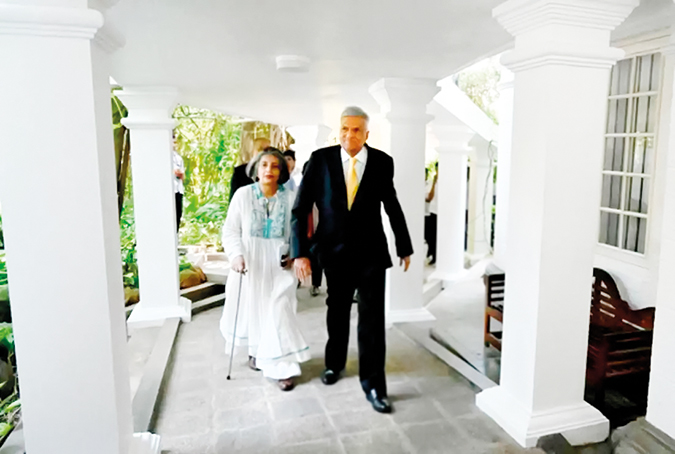
by Rajan Philips
The two articles on political and presidential reforms that I wrote for the Sunday Island (August 13 & 20), have elicited an interesting response from Dayan Jayatilleka (Sunday Island, August 27). Dr. Jayatilleka disagrees with both my “reform ideas” and my suggestion that now is the time for reforms, and proffers a “counterview” that the reform ideas are “regressive”, and now is “the worst time” for reform. He is, as he has consistently been, opposed to changing the current system of having the country’s President directly elected by the people.
He is also, as he has always been, dead set against expecting anything positive from Ranil Wickremesinghe or allowing him to continue in office even a minute longer than is constitutionally necessary. Dayan’s counter agenda for “engaged intellectuals” is to “focus on … Fighting to secure elections on schedule, most especially the presidential election, and combating the dangerous ideology of ‘economics before elections’.”
On the same Sunday (August 27), the Sunday Times carried Prof. Sirimal Abeyratne’s weekly column, coincidentally entitled, “Economy cornered with elections round the corner.” The contrasting viewpoints of a Political Scientist as a politically ‘engaged intellectual’, and a professional Economist without overt political affiliations, neatly sum up the country’s paradoxical political situation and the false prioritization between elections and economics.
There should be no economic reason for postponing elections beyond their due dates, or advancing them ahead of time. The reasons for election timing are always political, but no election in the current situation in Sri Lanka should be seen in isolation from the country’s current economic crisis. The latter is Prof. Abeyratne’s principal concern and the burden of his Sunday column, a concern that is not similarly shared or articulated by Dr. Jayatilleka.
It is the confluence of the political and the economic crises that I have argued, and still do, has led to – Ranil Wickremesinghe becoming the caretaker president, absence of strong presidential contenders as in the past, and the ‘hung situation’ in parliament. It is also my contention that it is this triple convergence that created a unique situation for implementing political and presidential reforms. The situation is obviously unprecedented and is unlikely to be repeated anytime in the future.
The premise for my identification of this situation as opportune, or propitious, for undertaking reforms is that it provides the opportunity for a ‘consociational’ approach (in this case involving principled alliances and voting blocs of political parties in the current parliament) to undertaking reforms, as opposed to a ‘plebiscitarian’ approach (seeking an electoral mandate and hoping for a tyrannical majority). This should not be confused with ‘top down’ elitism, because every item on a potential reform agenda has been thoroughly discussed up and down the political pole for decades on end.
Almost all of them are measures to correct the institutional blunders that political elites have been committing since 1977 and 1978. In any event, any and all reform measures will have to be passed by parliament, requiring a two-thirds majority in some cases, and even a referendum based on the Supreme Court’s basic structure interpretation and not necessarily the constitution’s text itself.
Vanishing Prospects
Regardless of Dayan Jayatilleka’s disagreements with my reform ideas, the reality is that the prospects for any kind of reform even in the current triple-convergent situation are fast vanishing. The main reason is that Ranil Wickremesinghe is not interested in using his accidental location at the summit of power for undertaking reform initiatives. All his political initiatives since becoming caretaker President have been to engineer a path to becoming the ‘incumbent’ candidate at the next presidential election. He cannot be both a candidate for election and a catalyst for reform, as I have contended earlier. Additionally, there is no sign of any external pressure (no Aragalaya Version 2) being brought on Mr. Wickremesinghe to play the role of a reform catalyst and scratch away his chronic itch to become an elected president.
The political opposition is not interested in forcing political reforms through the current parliament, but not quite for the same reasons that Dayan is suggesting, although Anura Dissanayake’s slogan “only a year to go”, or “less than 365 days to go”, might be an accurate measure of the opposition mood. But it is not clear which election everyone wants first.
For Dayan, it seems the presidential election, just like Ranil Wickremesinghe but for obviously opposite reasons. The JVP/NPP was all about local elections, and the SJB was earlier calling for parliamentary elections. And the President wants to implement 13A, but all executively with no provincial council elections. A reform agenda is not on anyone’s radar.
And if I am not misunderstanding Dr. Jayatilleke, he is not suggesting any potential reform path after a presidential or parliamentary election, or envisaging how and when such a path might open up. His broad perspective is all about fighting Ranil and supporting “one or the other change-agent, Sajith or Anura, while fighting for a broad bloc or platform for elections on schedule and a united front of parties around each candidate, so as to ‘social democratize’ them both to whatever degree possible.”
Make them social-democratic to whatever degree possible, and everything will be looked after by one or the other change-agent. Juxtapose this with Dayan’s intervention last week (Sunday Island, September 3), entitled, “Political Establishment Under Siege: Crisis of the UNP, SLFP, SLPP, SJB,” and you will recognize the difference between the depth of his diagnosis and the meagreness of his medication.
The problem of inadequate remedies is partly due to a national pre-occupation with elections. Heightened enthusiasm before elections and political ‘muddling through’ between them. In his Sunday Times column, Prof. Abeyratne provides an empirical review of the corrosive effects of multiplying elections after 1977 on the decision making apparatuses of governments. Specific to political reforms, especially presidential reforms, there is a 40 year history of election promises and post-election betrayals. That is why I am skeptical about reform initiatives coming to the fore after another round of elections. This is not being against elections but about the futility of expecting serious reforms after elections.
What is inexplicably bizarre is that no one in parliament is making any serious effort to at least have the electoral reforms completed before the next local, provincial or parliamentary elections. All the spade work has been done, bills have been drafted, but no one is bothered to take them over the finish line. Why have elections under existing laws if you are serious about changing them after the elections? Given the situation of a ‘hung parliament,’ a consociational approach is necessary and will work, but the initiative will have to come from the parliamentarians and no one else. Unfortunately, the MPs are as apathetic about taking initiatives as they are truant about attending parliament. Even the two designated change-agents are not showing leadership or demonstrating parliamentary skills to get at least the electoral reforms completed before the elections.
Revamping the administration is another matter, and even though it is not something that can be accomplished in a short time there is nothing to stop the current parliament from forcing the issue with the President. Even if not the whole gamut of administrative reform, why not at least make sure that a proper person is appointed as the new IGP well in time for whatever election that might come first? Two retired senior police officers have been recently writing about the mess that the National Police is in, and how political interference and police subservience have precipitated the mess.
There cannot be a better opportunity for the two change-agents to show what they are capable of by intervening to force positive changes starting with the appointment of a new IGP worthy of that position. They do not have to wait for an election, and proving their mettle in the current parliament will augur well for their role in the next parliament, especially if they were to lead the next government. But unless people see them in purposeful and persistent actions in the current parliament, not much could be expected of them in the next parliament.
Ending Presidential Elections
Dr. Jayatilleke’s strongest disagreement is of course with the suggestion to end the practice of directly electing the Head of State or President. He concedes, however, that “Sri Lanka’s presidency most certainly requires reforming but that … the reforms that are necessary are those that bring our presidency in line with those of the USA and France.” But none of that should or could be before the next presidential election. No reforms before elections, just as no economics before elections!
The idea of reforming the presidency and ending direct presidential elections is not something that I started in my two Sunday Island articles. That idea arose as the antithesis even as JR Jayewardene idiosyncratically imposed the presidential system on an unsuspecting Sri Lankan polity. In fact, the anti-theistic idea has always had greater support among “engaged intellectuals” than the insistence on continuing with direct presidential elections. Winning presidential candidates in every election from 1994 to 2015 ran on the promise of abolishing the executive presidential system. The exception came in 2019, fittingly with Gotabaya Rajapaksa.
For all the bile that is piled on Ranil Wickremesinghe, no one blames the Rajapaksas for picking Ranil outside the 6.2 millions who voted for them to be their saviour and to be the country’s caretaker. And the tradition of running to be president on the promise of ending the elected-executive presidency will likely be restored by Anura Kumara Dissanayake and by Sajith Premadasa at the next presidential election. That will be real change-agency. Whether either one of them will be able to accomplish it after the election is the question.
As for the merits and demerits of the executive presidential system, Dr. Jayatilleka invokes, as he often does but not necessarily accurately, the examples of France, the US and Latin America. He never pauses to mention, let alone honour, the name of JR Jayewardene and his patented product that was bequeathed to the country. But JRJ’s whole project was contemporaneously critiqued by someone called NM Perera, also a Political Scientist. That was the beginning of the anti-thesis to the elected-executive presidency. The introduction of the presidential system by JR Jayewardene and the adoption of the 13th Amendment during JRJ’s only term as elected president, were unrelated developments. They have since been turned into Siamese Twins. They might be inseparable, but they should not be unreformable.
Features
The heart-friendly health minister

by Dr Gotabhya Ranasinghe
Senior Consultant Cardiologist
National Hospital Sri Lanka
When we sought a meeting with Hon Dr. Ramesh Pathirana, Minister of Health, he graciously cleared his busy schedule to accommodate us. Renowned for his attentive listening and deep understanding, Minister Pathirana is dedicated to advancing the health sector. His openness and transparency exemplify the qualities of an exemplary politician and minister.
Dr. Palitha Mahipala, the current Health Secretary, demonstrates both commendable enthusiasm and unwavering support. This combination of attributes makes him a highly compatible colleague for the esteemed Minister of Health.
Our discussion centered on a project that has been in the works for the past 30 years, one that no other minister had managed to advance.
Minister Pathirana, however, recognized the project’s significance and its potential to revolutionize care for heart patients.
The project involves the construction of a state-of-the-art facility at the premises of the National Hospital Colombo. The project’s location within the premises of the National Hospital underscores its importance and relevance to the healthcare infrastructure of the nation.
This facility will include a cardiology building and a tertiary care center, equipped with the latest technology to handle and treat all types of heart-related conditions and surgeries.
Securing funding was a major milestone for this initiative. Minister Pathirana successfully obtained approval for a $40 billion loan from the Asian Development Bank. With the funding in place, the foundation stone is scheduled to be laid in September this year, and construction will begin in January 2025.
This project guarantees a consistent and uninterrupted supply of stents and related medications for heart patients. As a result, patients will have timely access to essential medical supplies during their treatment and recovery. By securing these critical resources, the project aims to enhance patient outcomes, minimize treatment delays, and maintain the highest standards of cardiac care.
Upon its fruition, this monumental building will serve as a beacon of hope and healing, symbolizing the unwavering dedication to improving patient outcomes and fostering a healthier society.We anticipate a future marked by significant progress and positive outcomes in Sri Lanka’s cardiovascular treatment landscape within the foreseeable timeframe.
Features
A LOVING TRIBUTE TO JESUIT FR. ALOYSIUS PIERIS ON HIS 90th BIRTHDAY

by Fr. Emmanuel Fernando, OMI
Jesuit Fr. Aloysius Pieris (affectionately called Fr. Aloy) celebrated his 90th birthday on April 9, 2024 and I, as the editor of our Oblate Journal, THE MISSIONARY OBLATE had gone to press by that time. Immediately I decided to publish an article, appreciating the untiring selfless services he continues to offer for inter-Faith dialogue, the renewal of the Catholic Church, his concern for the poor and the suffering Sri Lankan masses and to me, the present writer.
It was in 1988, when I was appointed Director of the Oblate Scholastics at Ampitiya by the then Oblate Provincial Fr. Anselm Silva, that I came to know Fr. Aloy more closely. Knowing well his expertise in matters spiritual, theological, Indological and pastoral, and with the collaborative spirit of my companion-formators, our Oblate Scholastics were sent to Tulana, the Research and Encounter Centre, Kelaniya, of which he is the Founder-Director, for ‘exposure-programmes’ on matters spiritual, biblical, theological and pastoral. Some of these dimensions according to my view and that of my companion-formators, were not available at the National Seminary, Ampitiya.
Ever since that time, our Oblate formators/ accompaniers at the Oblate Scholasticate, Ampitiya , have continued to send our Oblate Scholastics to Tulana Centre for deepening their insights and convictions regarding matters needed to serve the people in today’s context. Fr. Aloy also had tried very enthusiastically with the Oblate team headed by Frs. Oswald Firth and Clement Waidyasekara to begin a Theologate, directed by the Religious Congregations in Sri Lanka, for the contextual formation/ accompaniment of their members. It should very well be a desired goal of the Leaders / Provincials of the Religious Congregations.
Besides being a formator/accompanier at the Oblate Scholasticate, I was entrusted also with the task of editing and publishing our Oblate journal, ‘The Missionary Oblate’. To maintain the quality of the journal I continue to depend on Fr. Aloy for his thought-provoking and stimulating articles on Biblical Spirituality, Biblical Theology and Ecclesiology. I am very grateful to him for his generous assistance. Of late, his writings on renewal of the Church, initiated by Pope St. John XX111 and continued by Pope Francis through the Synodal path, published in our Oblate journal, enable our readers to focus their attention also on the needed renewal in the Catholic Church in Sri Lanka. Fr. Aloy appreciated very much the Synodal path adopted by the Jesuit Pope Francis for the renewal of the Church, rooted very much on prayerful discernment. In my Religious and presbyteral life, Fr.Aloy continues to be my spiritual animator / guide and ongoing formator / acccompanier.
Fr. Aloysius Pieris, BA Hons (Lond), LPh (SHC, India), STL (PFT, Naples), PhD (SLU/VC), ThD (Tilburg), D.Ltt (KU), has been one of the eminent Asian theologians well recognized internationally and one who has lectured and held visiting chairs in many universities both in the West and in the East. Many members of Religious Congregations from Asian countries have benefited from his lectures and guidance in the East Asian Pastoral Institute (EAPI) in Manila, Philippines. He had been a Theologian consulted by the Federation of Asian Bishops’ Conferences for many years. During his professorship at the Gregorian University in Rome, he was called to be a member of a special group of advisers on other religions consulted by Pope Paul VI.
Fr. Aloy is the author of more than 30 books and well over 500 Research Papers. Some of his books and articles have been translated and published in several countries. Among those books, one can find the following: 1) The Genesis of an Asian Theology of Liberation (An Autobiographical Excursus on the Art of Theologising in Asia, 2) An Asian Theology of Liberation, 3) Providential Timeliness of Vatican 11 (a long-overdue halt to a scandalous millennium, 4) Give Vatican 11 a chance, 5) Leadership in the Church, 6) Relishing our faith in working for justice (Themes for study and discussion), 7) A Message meant mainly, not exclusively for Jesuits (Background information necessary for helping Francis renew the Church), 8) Lent in Lanka (Reflections and Resolutions, 9) Love meets wisdom (A Christian Experience of Buddhism, 10) Fire and Water 11) God’s Reign for God’s poor, 12) Our Unhiddden Agenda (How we Jesuits work, pray and form our men). He is also the Editor of two journals, Vagdevi, Journal of Religious Reflection and Dialogue, New Series.
Fr. Aloy has a BA in Pali and Sanskrit from the University of London and a Ph.D in Buddhist Philosophy from the University of Sri Lankan, Vidyodaya Campus. On Nov. 23, 2019, he was awarded the prestigious honorary Doctorate of Literature (D.Litt) by the Chancellor of the University of Kelaniya, the Most Venerable Welamitiyawe Dharmakirthi Sri Kusala Dhamma Thera.
Fr. Aloy continues to be a promoter of Gospel values and virtues. Justice as a constitutive dimension of love and social concern for the downtrodden masses are very much noted in his life and work. He had very much appreciated the commitment of the late Fr. Joseph (Joe) Fernando, the National Director of the Social and Economic Centre (SEDEC) for the poor.
In Sri Lanka, a few religious Congregations – the Good Shepherd Sisters, the Christian Brothers, the Marist Brothers and the Oblates – have invited him to animate their members especially during their Provincial Congresses, Chapters and International Conferences. The mainline Christian Churches also have sought his advice and followed his seminars. I, for one, regret very much, that the Sri Lankan authorities of the Catholic Church –today’s Hierarchy—- have not sought Fr.
Aloy’s expertise for the renewal of the Catholic Church in Sri Lanka and thus have not benefited from the immense store of wisdom and insight that he can offer to our local Church while the Sri Lankan bishops who governed the Catholic church in the immediate aftermath of the Second Vatican Council (Edmund Fernando OMI, Anthony de Saram, Leo Nanayakkara OSB, Frank Marcus Fernando, Paul Perera,) visited him and consulted him on many matters. Among the Tamil Bishops, Bishop Rayappu Joseph was keeping close contact with him and Bishop J. Deogupillai hosted him and his team visiting him after the horrible Black July massacre of Tamils.
Features
A fairy tale, success or debacle

Sri Lanka-Singapore Free Trade Agreement
By Gomi Senadhira
senadhiragomi@gmail.com
“You might tell fairy tales, but the progress of a country cannot be achieved through such narratives. A country cannot be developed by making false promises. The country moved backward because of the electoral promises made by political parties throughout time. We have witnessed that the ultimate result of this is the country becoming bankrupt. Unfortunately, many segments of the population have not come to realize this yet.” – President Ranil Wickremesinghe, 2024 Budget speech
Any Sri Lankan would agree with the above words of President Wickremesinghe on the false promises our politicians and officials make and the fairy tales they narrate which bankrupted this country. So, to understand this, let’s look at one such fairy tale with lots of false promises; Ranil Wickremesinghe’s greatest achievement in the area of international trade and investment promotion during the Yahapalana period, Sri Lanka-Singapore Free Trade Agreement (SLSFTA).
It is appropriate and timely to do it now as Finance Minister Wickremesinghe has just presented to parliament a bill on the National Policy on Economic Transformation which includes the establishment of an Office for International Trade and the Sri Lanka Institute of Economics and International Trade.
Was SLSFTA a “Cleverly negotiated Free Trade Agreement” as stated by the (former) Minister of Development Strategies and International Trade Malik Samarawickrama during the Parliamentary Debate on the SLSFTA in July 2018, or a colossal blunder covered up with lies, false promises, and fairy tales? After SLSFTA was signed there were a number of fairy tales published on this agreement by the Ministry of Development Strategies and International, Institute of Policy Studies, and others.
However, for this article, I would like to limit my comments to the speech by Minister Samarawickrama during the Parliamentary Debate, and the two most important areas in the agreement which were covered up with lies, fairy tales, and false promises, namely: revenue loss for Sri Lanka and Investment from Singapore. On the other important area, “Waste products dumping” I do not want to comment here as I have written extensively on the issue.
1. The revenue loss
During the Parliamentary Debate in July 2018, Minister Samarawickrama stated “…. let me reiterate that this FTA with Singapore has been very cleverly negotiated by us…. The liberalisation programme under this FTA has been carefully designed to have the least impact on domestic industry and revenue collection. We have included all revenue sensitive items in the negative list of items which will not be subject to removal of tariff. Therefore, 97.8% revenue from Customs duty is protected. Our tariff liberalisation will take place over a period of 12-15 years! In fact, the revenue earned through tariffs on goods imported from Singapore last year was Rs. 35 billion.
The revenue loss for over the next 15 years due to the FTA is only Rs. 733 million– which when annualised, on average, is just Rs. 51 million. That is just 0.14% per year! So anyone who claims the Singapore FTA causes revenue loss to the Government cannot do basic arithmetic! Mr. Speaker, in conclusion, I call on my fellow members of this House – don’t mislead the public with baseless criticism that is not grounded in facts. Don’t look at petty politics and use these issues for your own political survival.”
I was surprised to read the minister’s speech because an article published in January 2018 in “The Straits Times“, based on information released by the Singaporean Negotiators stated, “…. With the FTA, tariff savings for Singapore exports are estimated to hit $10 million annually“.
As the annual tariff savings (that is the revenue loss for Sri Lanka) calculated by the Singaporean Negotiators, Singaporean $ 10 million (Sri Lankan rupees 1,200 million in 2018) was way above the rupees’ 733 million revenue loss for 15 years estimated by the Sri Lankan negotiators, it was clear to any observer that one of the parties to the agreement had not done the basic arithmetic!
Six years later, according to a report published by “The Morning” newspaper, speaking at the Committee on Public Finance (COPF) on 7th May 2024, Mr Samarawickrama’s chief trade negotiator K.J. Weerasinghehad had admitted “…. that forecasted revenue loss for the Government of Sri Lanka through the Singapore FTA is Rs. 450 million in 2023 and Rs. 1.3 billion in 2024.”
If these numbers are correct, as tariff liberalisation under the SLSFTA has just started, we will pass Rs 2 billion very soon. Then, the question is how Sri Lanka’s trade negotiators made such a colossal blunder. Didn’t they do their basic arithmetic? If they didn’t know how to do basic arithmetic they should have at least done their basic readings. For example, the headline of the article published in The Straits Times in January 2018 was “Singapore, Sri Lanka sign FTA, annual savings of $10m expected”.
Anyway, as Sri Lanka’s chief negotiator reiterated at the COPF meeting that “…. since 99% of the tariffs in Singapore have zero rates of duty, Sri Lanka has agreed on 80% tariff liberalisation over a period of 15 years while expecting Singapore investments to address the imbalance in trade,” let’s turn towards investment.
Investment from Singapore
In July 2018, speaking during the Parliamentary Debate on the FTA this is what Minister Malik Samarawickrama stated on investment from Singapore, “Already, thanks to this FTA, in just the past two-and-a-half months since the agreement came into effect we have received a proposal from Singapore for investment amounting to $ 14.8 billion in an oil refinery for export of petroleum products. In addition, we have proposals for a steel manufacturing plant for exports ($ 1 billion investment), flour milling plant ($ 50 million), sugar refinery ($ 200 million). This adds up to more than $ 16.05 billion in the pipeline on these projects alone.
And all of these projects will create thousands of more jobs for our people. In principle approval has already been granted by the BOI and the investors are awaiting the release of land the environmental approvals to commence the project.
I request the Opposition and those with vested interests to change their narrow-minded thinking and join us to develop our country. We must always look at what is best for the whole community, not just the few who may oppose. We owe it to our people to courageously take decisions that will change their lives for the better.”
According to the media report I quoted earlier, speaking at the Committee on Public Finance (COPF) Chief Negotiator Weerasinghe has admitted that Sri Lanka was not happy with overall Singapore investments that have come in the past few years in return for the trade liberalisation under the Singapore-Sri Lanka Free Trade Agreement. He has added that between 2021 and 2023 the total investment from Singapore had been around $162 million!
What happened to those projects worth $16 billion negotiated, thanks to the SLSFTA, in just the two-and-a-half months after the agreement came into effect and approved by the BOI? I do not know about the steel manufacturing plant for exports ($ 1 billion investment), flour milling plant ($ 50 million) and sugar refinery ($ 200 million).
However, story of the multibillion-dollar investment in the Petroleum Refinery unfolded in a manner that would qualify it as the best fairy tale with false promises presented by our politicians and the officials, prior to 2019 elections.
Though many Sri Lankans got to know, through the media which repeatedly highlighted a plethora of issues surrounding the project and the questionable credentials of the Singaporean investor, the construction work on the Mirrijiwela Oil Refinery along with the cement factory began on the24th of March 2019 with a bang and Minister Ranil Wickremesinghe and his ministers along with the foreign and local dignitaries laid the foundation stones.
That was few months before the 2019 Presidential elections. Inaugurating the construction work Prime Minister Ranil Wickremesinghe said the projects will create thousands of job opportunities in the area and surrounding districts.
The oil refinery, which was to be built over 200 acres of land, with the capacity to refine 200,000 barrels of crude oil per day, was to generate US$7 billion of exports and create 1,500 direct and 3,000 indirect jobs. The construction of the refinery was to be completed in 44 months. Four years later, in August 2023 the Cabinet of Ministers approved the proposal presented by President Ranil Wickremesinghe to cancel the agreement with the investors of the refinery as the project has not been implemented! Can they explain to the country how much money was wasted to produce that fairy tale?
It is obvious that the President, ministers, and officials had made huge blunders and had deliberately misled the public and the parliament on the revenue loss and potential investment from SLSFTA with fairy tales and false promises.
As the president himself said, a country cannot be developed by making false promises or with fairy tales and these false promises and fairy tales had bankrupted the country. “Unfortunately, many segments of the population have not come to realize this yet”.
(The writer, a specialist and an activist on trade and development issues . )


